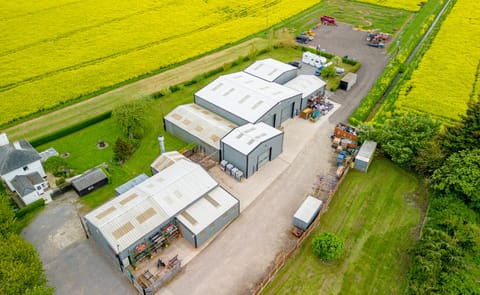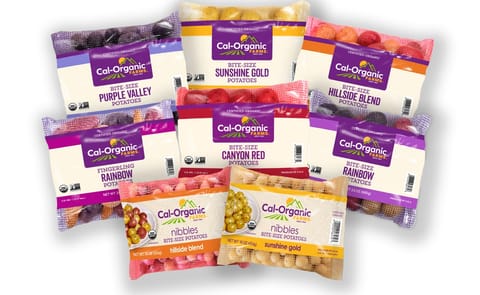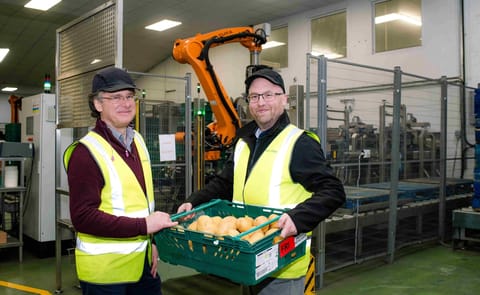Nestle's Pizza brands find that TOMRA Food's smart Sort Tecnology is best for protection food safety
Nestle's Pizza brands find that TOMRA Food's smart Sort Technology is best for protecting food safety

Nestlé now has more than 2000 brands, including global icons and local favorites. Their products can be found in 187 countries worldwide - quite an expansion from their humble beginnings producing condensed milk and infant cereal in the Alps.
It’s not delivery, it’s defrosting
It’s a lazy Sunday - slightly rainy outside, and you hear the oven beep to notify you it has finished reheating. Sliding across the kitchen to the fridge, like Tom Cruise in Risky Business, you open the freezer to grab your frozen Supreme Pizza and place it in the oven.
In no time, you are pulling it out, cutting slices, and with impatient eagerness, trying not to burn the roof of your mouth on the scalding hot cheese. If this sounds familiar, you likely have tried some of Nestle’s frozen pizza brands, including Jack’s, Wagner, Tombstone, and DiGiorno.
It’s not only college kids and families who want another slice. With the extreme convenience and value that frozen pizzas boast, it’s no wonder their popularity continues to rise like a deep-dish crust every year. The toppings on frozen pizzas are grown and harvested by farmers, and nature brings its own variables and unpredictability.
During harvesting, foreign materials, such as sticks, stones, glass, and plastics can get mixed in with the crop. Farmers and suppliers implement safety checks before sending these products to processors, but further screening from Nestlé eliminates these and other foreign materials.
These safety inspections utilize the most advanced sorting technologies to enhance product safety, and to ensure that only the highest quality ingredients adorn your frozen pizza.
The goal – continuous improvement
In 2014 at their Nonnweiler, Germany pizza factory, Nestlé dedicated space for a temporary installation and invited a handful of sorting companies to prove their machines’ capabilities - allowing them to run product samples for a couple of weeks.
After extensive testing, research, and validation, Nestlé decided the TOMRA sorter met their needs best and cited the Smart Sort technology as the deciding factor.
Will Hutson, Quality Manager Nestlé R&D:
 In layman’s terms, the quality check process involves taking the raw material out of totes or cases, putting it through a series of inspections, and then putting it back in totes after it has been determined it is safe and desirable.
In layman’s terms, the quality check process involves taking the raw material out of totes or cases, putting it through a series of inspections, and then putting it back in totes after it has been determined it is safe and desirable.
The first two examinations see the toppings pass through a bulk X-ray machine and then over a magnet to remove any remaining metals. The final check sees the remaining good materials travel through the TOMRA optical sorter before finally returning to the totes.
Adam Weber, Senior Expert Supplier Quality Management, Nestlé R&D:
Employing TOMRA sorters has positively impacted Nestlé’s procedure, adding an invaluable point in the process to reduce the risk of foreign matter ending up in the final product for higher quality products makes a world of difference.
Employing TOMRA sorters has positively impacted Nestlé’s procedure, adding an invaluable point in the process to reduce the risk of foreign matter ending up in the final product.
95,000 lbs in a one-shift operation
With their TOMRA Nimbus, Nestlé processes around 15 million pounds of raw material here at the Solon, Ohio facility in a year, where they distribute toppings to three other production locations around the United States.
The machine’s robust capabilities allow production lines to continue running the highest volumes while also rendering data that allows them to notify suppliers of product quality trends earlier in the supply chain.
Will Hutson, Quality Manager, Nestlé R&D:
Nestlé utilizes TOMRA optical sorters for their Frozen Food operations at Solon (United States) and at their Nonnweiler facility in Germany. A corporate recommendation and Nestlé's commitment to food quality & safety led to the discovery and implementation of TOMRA sorters.
Their dedication to continuous process improvement, food safety, and offering their customers the highest quality product keeps bringing them back for more.
It’s not delivery, it’s defrosting
It’s a lazy Sunday - slightly rainy outside, and you hear the oven beep to notify you it has finished reheating. Sliding across the kitchen to the fridge, like Tom Cruise in Risky Business, you open the freezer to grab your frozen Supreme Pizza and place it in the oven.
In no time, you are pulling it out, cutting slices, and with impatient eagerness, trying not to burn the roof of your mouth on the scalding hot cheese. If this sounds familiar, you likely have tried some of Nestle’s frozen pizza brands, including Jack’s, Wagner, Tombstone, and DiGiorno.
It’s not only college kids and families who want another slice. With the extreme convenience and value that frozen pizzas boast, it’s no wonder their popularity continues to rise like a deep-dish crust every year. The toppings on frozen pizzas are grown and harvested by farmers, and nature brings its own variables and unpredictability.
During harvesting, foreign materials, such as sticks, stones, glass, and plastics can get mixed in with the crop. Farmers and suppliers implement safety checks before sending these products to processors, but further screening from Nestlé eliminates these and other foreign materials.
These safety inspections utilize the most advanced sorting technologies to enhance product safety, and to ensure that only the highest quality ingredients adorn your frozen pizza.
The goal – continuous improvement
In 2014 at their Nonnweiler, Germany pizza factory, Nestlé dedicated space for a temporary installation and invited a handful of sorting companies to prove their machines’ capabilities - allowing them to run product samples for a couple of weeks.
After extensive testing, research, and validation, Nestlé decided the TOMRA sorter met their needs best and cited the Smart Sort technology as the deciding factor.
Will Hutson, Quality Manager Nestlé R&D:
"TOMRA Food stood out here with their ability to identify good products and not only remove the defects. The other machines had a longer material setup process but could only identify defects. With the Nimbus, we could train the machine which imperfections to reject while also teaching the machine what desirable products looked like."Optical sorting is vital for product safety

TOMRA's optical sorters at Nestle
The first two examinations see the toppings pass through a bulk X-ray machine and then over a magnet to remove any remaining metals. The final check sees the remaining good materials travel through the TOMRA optical sorter before finally returning to the totes.
Adam Weber, Senior Expert Supplier Quality Management, Nestlé R&D:
"One of the key strategic advantages of this technology is the ability to segregate material defects across an entire batch, and use this data as an input to supplier performance."Food trends continually change and stress the importance of an operation’s capacity to adapt quickly. Being agile and evolving to meet the customers’ desires for higher-quality products makes a world of difference.
"The ability to partner with your suppliers and provide this type of feedback drives the continuous improvement cycle, ultimately increasing overall consumer satisfaction."
Employing TOMRA sorters has positively impacted Nestlé’s procedure, adding an invaluable point in the process to reduce the risk of foreign matter ending up in the final product for higher quality products makes a world of difference.
Employing TOMRA sorters has positively impacted Nestlé’s procedure, adding an invaluable point in the process to reduce the risk of foreign matter ending up in the final product.
95,000 lbs in a one-shift operation
With their TOMRA Nimbus, Nestlé processes around 15 million pounds of raw material here at the Solon, Ohio facility in a year, where they distribute toppings to three other production locations around the United States.
The machine’s robust capabilities allow production lines to continue running the highest volumes while also rendering data that allows them to notify suppliers of product quality trends earlier in the supply chain.
Will Hutson, Quality Manager, Nestlé R&D:
"Based on our previous equipment testing and the growing relationship, Nestlé trusted TOMRA’s experience and equipment and remains confident in our partnership. The equipment’s quality and reliability minimized the need for support or interaction.Who wants another slice?
After the initial commissioning and training by TOMRA, the local team has been able to operate the unit independently. They’ve barely had to interact with it, except to change a program or recipe to accommodate the different incoming frozen veggies being screened, and that speaks volumes."
Nestlé utilizes TOMRA optical sorters for their Frozen Food operations at Solon (United States) and at their Nonnweiler facility in Germany. A corporate recommendation and Nestlé's commitment to food quality & safety led to the discovery and implementation of TOMRA sorters.
Their dedication to continuous process improvement, food safety, and offering their customers the highest quality product keeps bringing them back for more.
Like to receive news like this by email? Join and Subscribe!
Get the latest potato industry news straight to your WhatsApp. Join the PotatoPro WhatsApp Community!
Highlighted Company
Sponsored Content
Sponsored Content
Sponsored Content
Sponsored Content










